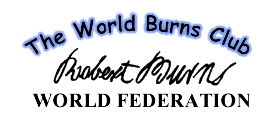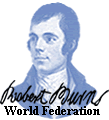


 |
 |
 |
Contributed by our regular Whisky expert
Alex Kraaijeveld
Celebrating the birth of Robert Burns on January 25, 1759
Robert Burns was not averse to drinking alcoholic liquors, and there were times in his life when he hit the bottle pretty hard. From his poetic works and his letters, we know that he drunk ale, wine (particularly claret), port, rum, Nantz (a type of brandy) and, of course, whisky. But did he like a particular whisky? Did he have a favourite dram?
 Most
references to whisky in Burns' poems and songs are to 'whisky', 'usquabae',
or 'aqua-vitae' in general. However, in "Scotch Drink", composed
in the winter of 1785-6 to celebrate both 'juices of the barley' (whisky and
her fermented sister ale), Burns mentions the most famous whisky of the period
explicitly: Ferintosh. The verse starting with Thee, Ferintosh! O sadly lost!
is probably Burns' most quoted verse in whisky literature.
Most
references to whisky in Burns' poems and songs are to 'whisky', 'usquabae',
or 'aqua-vitae' in general. However, in "Scotch Drink", composed
in the winter of 1785-6 to celebrate both 'juices of the barley' (whisky and
her fermented sister ale), Burns mentions the most famous whisky of the period
explicitly: Ferintosh. The verse starting with Thee, Ferintosh! O sadly lost!
is probably Burns' most quoted verse in whisky literature.
Ferintosh whisky came from the Black Isle, north of Inverness. In 1690, a
privilege was granted to Duncan Forbes of Culloden to distil free of duty
on his Ferintosh estate. This privilege was to reward his loyalty to the government
and as compensation for the burning of his distillery in a Jacobite attack.
From 1690 on, the Ferintosh whisky empire had gradually expanded and at the
time of Burns, there was not one single Ferintosh distillery, but at least
four on Culloden's estate.
The outcry in "Scotch Drink" lamenting the loss of Ferintosh is
due to the withdrawal of the privilege as part of the Wash Act of 1784. The
end of duty-free distilling did lead to Forbes' distilleries closing, but
not to the end of Ferintosh-distilled whisky: the parish report of Urquhart
in the Statistical Account of Scotland, written by Rev. Charles Calder in
1792, talks about distilling having resumed at Ferintosh with 29 licensed
stills at the time of writing, less than ten years after the end of the Ferintosh
privilege.
Ferintosh whisky is mentioned again by Burns in a letter to David Blair, a
gun maker. The letter talks about a durk (a dagger), which Blair had in his
possession at the time of writing, but which originally belonged to Lord Balmerino.
Burns describes the wanderings of the durk and how it was sold to a friend
of his for an anker of Ferintosh whisky a number of years ago.
 Another
whisky Burns mentions explicitly is in "The Jolly Beggars": And
by that dear Kilbaigie! The inspiration for "The Jolly Beggars"
was a visit by Burns and a friend of his to Poosie Nansie's, a tavern (and
possibly also a brothel) in Mauchline, frequented by vagabonds, beggars and
tramps. Whisky from the Kilbagie distillery appears to have been the favourite
spirit in the tavern. The Kilbagie distillery was one of the large Lowland
distilleries which used shallow flat-bottomed stills that could be run off
in minutes. Not surprisingly, the spirit from such stills was notorious for
its harshness, although most of it was exported to England to be rectified
into gin. As Burns associates Kilbagie whisky with the low end of society,
he almost surely didn't think much of its quality. Due to changes in the Excise
laws during the 1780s, the distillery fell silent a few years after Burns'
visit to Poosie Nansie's, but resumed operation in 1794 until it closed in
the 1850s. Poosie Nansie's on the other hand survived up to the present day
.....
Another
whisky Burns mentions explicitly is in "The Jolly Beggars": And
by that dear Kilbaigie! The inspiration for "The Jolly Beggars"
was a visit by Burns and a friend of his to Poosie Nansie's, a tavern (and
possibly also a brothel) in Mauchline, frequented by vagabonds, beggars and
tramps. Whisky from the Kilbagie distillery appears to have been the favourite
spirit in the tavern. The Kilbagie distillery was one of the large Lowland
distilleries which used shallow flat-bottomed stills that could be run off
in minutes. Not surprisingly, the spirit from such stills was notorious for
its harshness, although most of it was exported to England to be rectified
into gin. As Burns associates Kilbagie whisky with the low end of society,
he almost surely didn't think much of its quality. Due to changes in the Excise
laws during the 1780s, the distillery fell silent a few years after Burns'
visit to Poosie Nansie's, but resumed operation in 1794 until it closed in
the 1850s. Poosie Nansie's on the other hand survived up to the present day
.....
I could find one more reference to a particular whisky, in a letter Burns
wrote to John 'Auchenbay' Tennant, of Glenconner, in the parish of Ochiltree.
The Burns and Tennant families had been neighbours for a long time. Burns'
father and John Sr ('Auld Glen') had been good friends and the friendship
had naturally passed on to the next generation. One of John Jr's businesses
was whisky distilling and it appears his distillery had failed shortly before
Burns wrote his letter in 1788. Burns is impressed by the quality of the whisky
he obtained from Tennant: I yesterday tried my cask of whisky for the first
time, and I assure you it does you great credit. - It will bear five waters,
strong; or six, ordinary Toddy. - The Whisky of this county is a most rascally
liquor; and by consequence, only drunk by the most rascally part of the inhabitants.
Burns goes on to suggest Tennant starts up his whisky business again and mentions
a reaction he got from a publican and his wife: They were perfectly astonished
at my whisky, both for its taste & strength, and by their desire I write
you to know if you could supply them with liquor of an equal quality, and
at what price.
The rascally liquor Burns mentions as the product of this county is the harsh
spirit that came out of the shallow flat-bottomed stills of the big Lowland
distilleries; he may very well have had Kilbagie whisky in mind when he wrote
that. Obviously, Tennant's cask of whisky is something different, but it is
not clear whether it was from Tennant's own distillery. Tennant's distillery
is not in the distillery lists published by Michael Moss and John Hume and
it is not known when it went out of business. If the whisky in the cask was
indeed distilled by Tennant himself, it must have come from a traditionally-shaped
still. On the other hand, it is quite possible that Tennant had only acted
as a trader and the cask contained (illicit?) Highland whisky. Both possibilities
would certainly explain the difference in taste Burns is so explicit about.
As to the question of whether Robert Burns had a favourite dram, keep in mind that in those days, at the end of the 18th century, whisky was not branded and marketed as it is today. But if we put the few bits and pieces together, they do suggest that, if anything, Burns seems to have had a preference for traditional Highland whisky. He was a man of taste, obviously!
Alex Kraaijeveld
This article is simultaneously published in the internet whisky journal "Celtic Spirit" at www.celticmalts.com